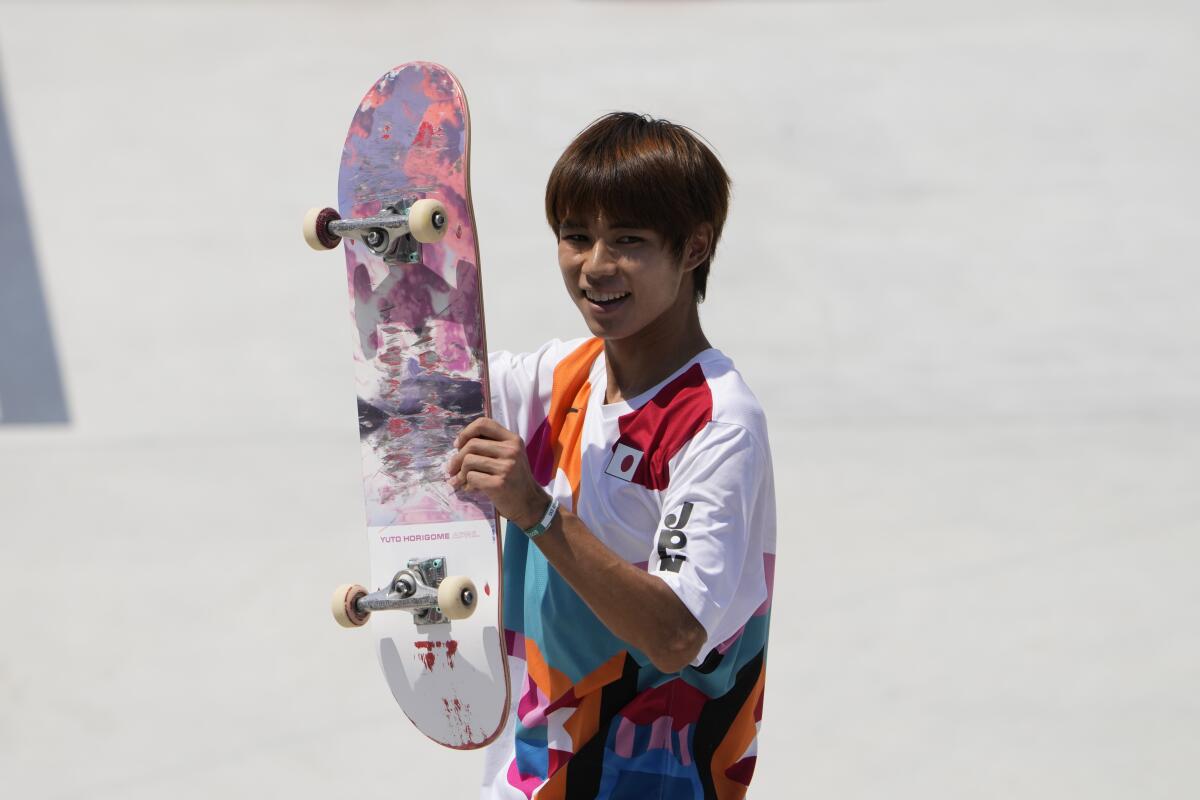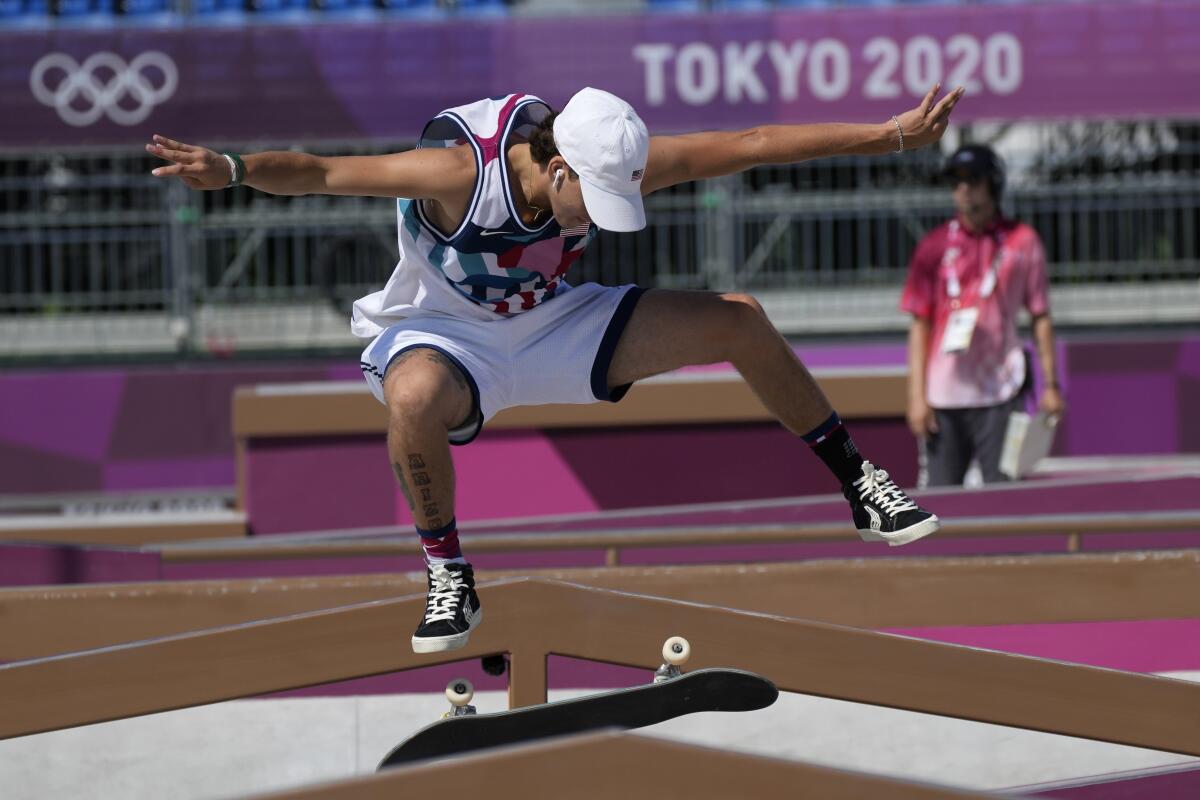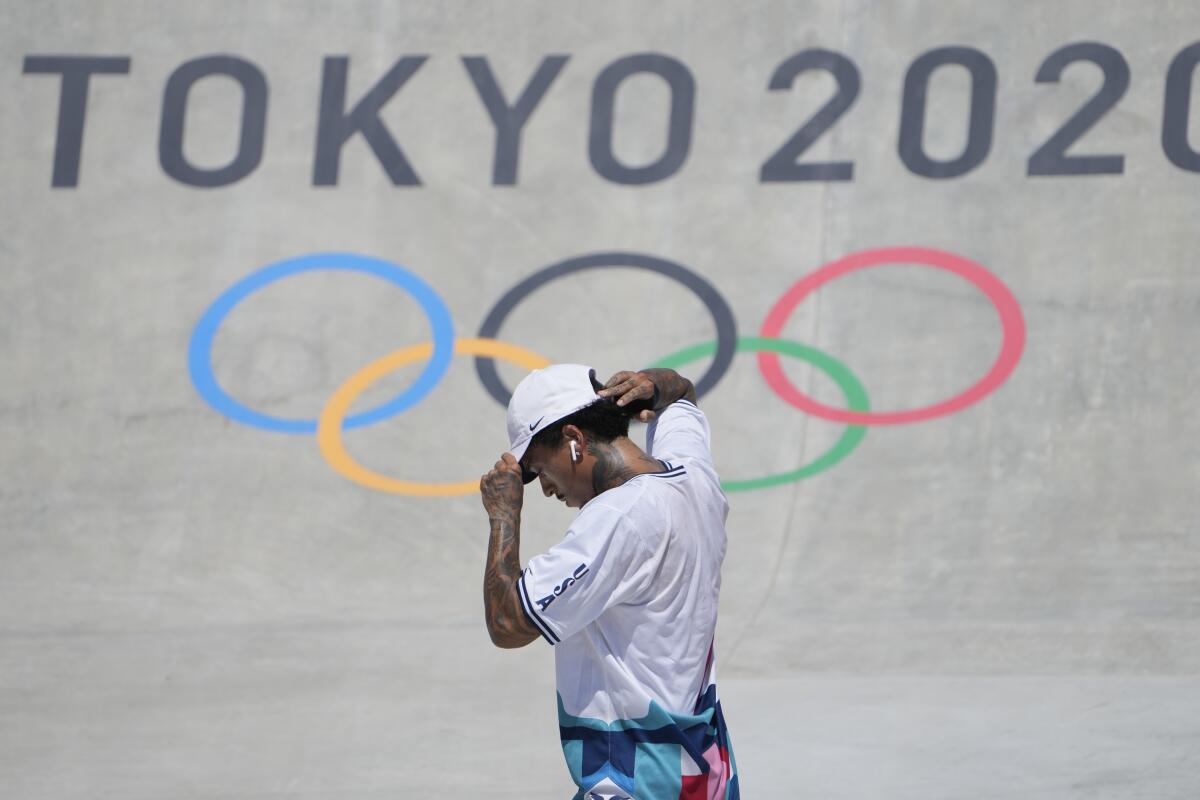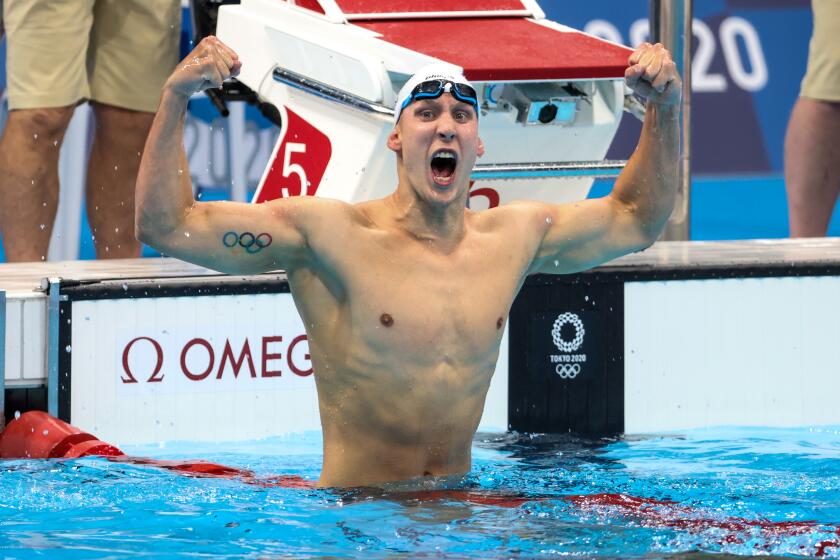Japan’s Yuto Horigome takes gold in street skateboarding, besting U.S. efforts

TOKYO — Skateboarding was born in California. But the first gold medal in the new Olympic sport belongs to Japan.
Specifically, Yuto Horigome, winner of the inaugural men’s street competition Sunday at Ariake Urban Sports Park.
Horigome, the reigning world champion, defeated a field that included Nyjah Huston of the United States, the most successful contest street skater in the history of the sport.
And Horigome, 22, did it in his hometown.
“Even right now, I can’t really believe that I’m here at the Olympic Games,” Horigome, who was born in Koto ward of Tokyo, said through an interpreter. “I was able to perform the best and I am super happy.”
Chase Kalisz wins the first U.S. medal at the Tokyo Olympic Games, earning gold in the men’s 400-meter individual medley. Jay Litherland captures silver.
Huston was in contention until he fell on three consecutive trick attempts on a 12-stair rail, opening the door for Horigome to take firm control of the competition. Huston also fell on his final trick attempt.
“All the people that are back home, and all the homies … I’m sorry,” Huston said. “I know I definitely let people down. And I have no problem admitting that. I’m human.”
Kelvin Hoefler of Brazil won the silver medal, and Jagger Eaton of the United States bronze.
“Very stoked right now,” Eaton said.
That probably would have been the mood of Japanese fans had they been able to see Yuto win the gold medal in person. But with much of the country under a state of emergency because of the COVID-19 pandemic, no spectators are allowed at Olympic events in Tokyo.

Horigome’s victory, however, was another bright spot for Japan, which won its first gold medal of the Games on Saturday night in judo. Now, Horigome’s victory could fuel the growth of skateboarding in his home country.
Huston, 26, has been a major skateboarding influencer for years. The Laguna Beach resident has earned millions of dollars since turning pro at age 11.
His success on and off his skateboard made him one of the sport’s most recognizable faces coming into an Olympics that adopted skateboarding, BMX and other new competitions to attract a younger audience.
“Some new vibes,” Huston told reporters Sunday after he qualified for the finals. “Some new energy that I feel like was kind of needed in the Olympics.”
Though the stadium had no fans, the energy was high in the minutes leading up to the start of Sunday’s qualifying heats. On a very hot morning, with spectacular white clouds above the Tokyo skyline, the mood was lighter than the staid atmosphere of some Olympic venues.
“We’re 20 minutes away from dropping in our first skater!” the public address announcer said, later adding, “It feels like 7,000 degrees out there. ... Hopefully, nobody spontaneously combusts.”
After dominating major contests for years, Huston was not regarded as a candidate to wilt under expectations.

But he acknowledged added pressure because of the scope and reach of the Games.
“I was really excited, also really nervous,” Huston said. “I have never felt so much pressure from, like, representing your country.”
During qualifying heats, skaters were judged on two 45-second runs through the massive concrete park that featured rails and staircases. Huston fell on his first two tricks, but he came up big on his next two and landed his final one to advance to the finals.
Before the final round, Huston told reporters “there’s no comparison” between the pressure of performing in regular contests and competing in the Olympics.
“I feel the pressure from the Olympics, but I also feel a lot of pressure just from like all my friends and homies and everyone in the USA that’s rooting for me, because we never skated for our country before,” he said. “That means a lot, and it’s definitely extra motivation but also more pressure.”
The pressure mounted in the finals. Competitors performed two rounds of runs and five tricks, with their four highest scores counting.
Huston earned a 9.09 for his first trick. But he fell on the next three and again on his final one.
“You know, it’s hard,” he said. “You’re doing tricks that are technical and flipping and spinning your board onto a rail, it’s hard to get the right one every time.”
Horigome took advantage, earning a 9.35, 9.50 and 9.30 on his final three tricks. The second to last all but clinched the victory for a skater who lives and trains part of the year in Southern California.
“That was new,” he said. “Maybe five minutes prior to the finals, I actually started practicing that trick. I was really nervous, but I was super happy when I made it.”
Huston said skateboarding was “a very young sport,” and that Horigome and the 20-year-old Eaton are the future. But he did not rule out his return to the Olympics in three years in Paris.
“I’m honestly excited to get back home and get back to real skateboarding life,” he said, “and just having fun with it and not feeling so much pressure all the time.”









